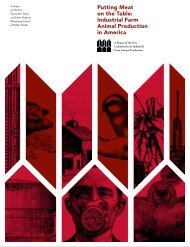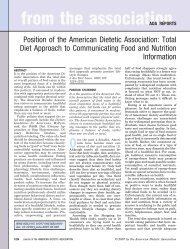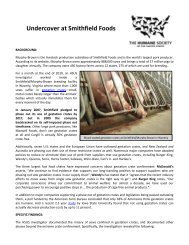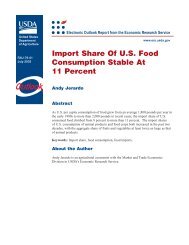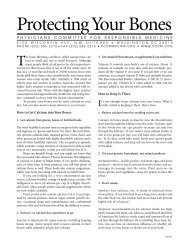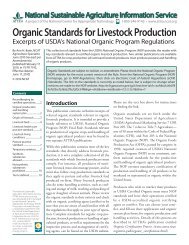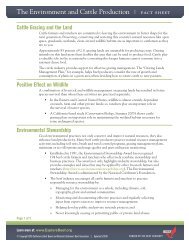THE MYTHS OF VEGETARIANISM Stephen Byrnes, PhD
THE MYTHS OF VEGETARIANISM Stephen Byrnes, PhD
THE MYTHS OF VEGETARIANISM Stephen Byrnes, PhD
You also want an ePaper? Increase the reach of your titles
YUMPU automatically turns print PDFs into web optimized ePapers that Google loves.
acidic conditions in the blood, resulting in calcium leaching from the bones and, hence, a greatertendency to form kidney stones. This opinion is false, however. Theoretically, the sulphur andphosphorous in meat can form an acid when placed in water, but that does not mean that iswhat happens in the body. Actually, meat contains complete proteins and vitamin D (if the skinand fat are eaten), both of which help maintain pH balance in the bloodstream. Furthermore, ifone eats a diet that includes enough magnesium and vitamin B6, and restricts refined sugars,one has little to fear from kidney stones, whether one eats meat or not (36). Animal foods likebeef, pork, fish, and lamb are good sources of magnesium and B6 as any food/nutrient table willshow.HEART DISEASEThe belief that animal protein contributes to heart disease is a popular one that has nofoundation in nutritional science. Outside of questionable studies, there is little data to supportthe idea that meat-eating leads to heart disease. For example, the French have one of thehighest per capita consumption of meat, yet have low rates of heart disease. In Greece, meatconsumption is higher than average but rates of heart disease are low there as well. Finally, inSpain, an increase in meat eating (in conjunction with a reduction in sugar and high carbohydrateintake) led to a decrease in heart disease (37).CANCERThe belief that meat, in particular red meat, contributes to cancer is, like heart disease, a popularidea that is not supported by the facts. Although it is true that some studies have shown aconnection between meat eating and some types of cancer (38), its important to look at thestudies carefully to determine what kind of meat is being discussed, as well as the preparationmethods used. Since we only have one word for “meat” in English, it is often difficult to knowwhich “meat” is under discussion in a study unless the authors of the study specifically say so.The study which began the meat=cancer theory was done by Dr. Ernst Wynder in the 1970s.Wynder claimed that there was a direct, causal connection between animal fat intake andincidence of colon cancer (39). Actually, his data on “animal fats” were really on vegetable fats(40). In other words, the meat=cancer theory is based on a phony study.If one looks closely at the research, however, one quickly sees that it is processed meats like coldcuts and sausages that are usually implicated in cancer causation (41) and not meat per se.Furthermore, cooking methods seem to play a part in whether or not a meat becomescarcinogenic (42). In other words, it is the added chemicals to the meat and the chosen cookingmethod that are at fault and not the meat itself.In the end, although sometimes a connection between meat and cancer is found, the actualmechanism of how it happens has eluded scientists (43). This means that it is likely that otherfactors besides meat are playing roles in some cases of cancer. Remember: studies of meateatingtraditional peoples show that they have very little incidence of cancer. This demonstratesthat other factors are at work when cancer appears in a modern meat-eating person. It is notscientifically fair to single out one dietary factor in placing blame, while ignoring other more likelycandidates.It should be noted here that Seventh Day Adventists are often studied in population analyses toprove that a vegetarian diet is healthier and is associated with a lower risk for cancer (but see alater paragraph in this section). While it is true that most members of this Christian denomination



